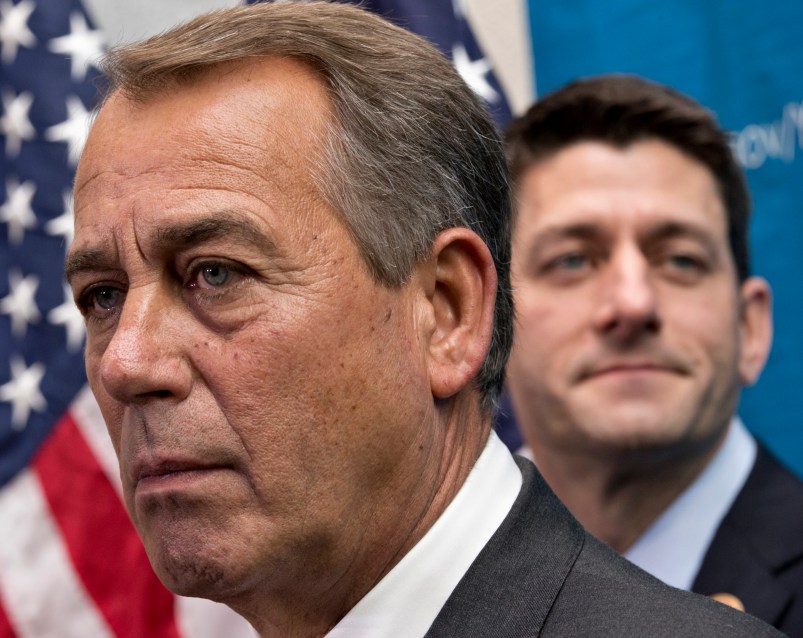WASHINGTON — For Republicans, winning the potentially decisive vote of Chief Justice John Roberts to gut a centerpiece of Obamacare could hinge on persuading him that the health care system won’t descend into chaos if he grants them their wish.
So Republican leaders are eager to convey to the chief justice, who is protective of the Supreme Court’s institutional legitimacy, that they will be ready to act. There’s virtually no chance Republicans will have a contingency plan ready by March 6, when the justices will meet privately to decide the case, and doubtful that they’ll be able to rally around a solution by the end of June, when a ruling is expected.
“We feel obligated to have a contingency plan if King v. Burwell goes to King,” Rep. Paul Ryan (R-WI), a key committee chairman overseeing health care policy, told reporters Friday on Capitol Hill. “The idea is to show what our alternative to Obamacare would look like.”
Earlier in February, House Republicans passed an Obamacare repeal bill that instructed key committees to report out replacement health care legislation, for the first time in more than 50 votes to dismantle the law. It was intended as a signal to the chief justice: we’ll be ready to act. GOP leaders have also touted working groups to craft a contingency plan.
“It matters that the political branches show that they’re taking it seriously and they are responding to the concerns this creates,” law professor Jonathan Adler, an architect of the King legal challenge, told TPM in a phone interview Thursday. “It’s a problem the political branch has created, and it’s the political branch’s job to fix it. … For Chief Justice Roberts I think it’s enough to show that the political process is capable of solving whatever the political branches need to be solved.”
One conservative source close to the case recently explained that the Republican discussions about contingency plans were largely aimed at the chief justice. The source, who requested anonymity to speak candidly, described it as an attempt to “make the world safe for Roberts to overturn” the subsidies and to “not let our guys look like they’re going crazy and letting the world spin into chaos.”
That’s easier said than done. Scratch beneath the surface and the GOP effort to devise an alternative is a mess. Republican leaders have offered no specifics beyond their longstanding call for “patient-centered” solutions. The party is nowhere close to a viable plan, aides privately say, stymied by the same obstacles they’ve faced for five years: deep internal divisions and a lack of economically feasible options to cover the uninsured without mandates or regulations or higher taxes and spending.
The legal case for the King challengers, fleshed out in their closing brief with the Supreme Court filed Wednesday, rests heavily on the text in the statute that says subsidies are available to those enrolled through “an Exchange established by the State.” To bolster their case, the challengers make the unsubstantiated argument that this wasn’t merely a drafting error and that Congress intended to deny subsidies on federal exchanges.
Legal issues aside, the real-world consequences of the case loom large, and Obamacare supporters are highlighting them. Millions of Americans in some three dozen states that use the federal exchange risk losing their coverage. Insurance markets could be thrown into turmoil as young and healthy patients drop out, causing a feared “death spiral” of rising costs as insurers raise premiums to compensate. Notably, unlike in 2012, business and health industry groups who dislike the law aren’t asking for a ruling against it.
The job of preventing this chaos would fall to GOP leaders as the Obama administration’s options would be severely limited if it loses the case.
“We don’t have [a plan] yet, so I can’t tell you what it is,” Ryan said when pressed for specifics. He ruled out changes to make Obamacare work better or tweaks to make clear the subsidies are available in all states, instead saying the goal would be to help states “get out of Obamacare.”
One top Republican, Sen. Lamar Alexander (TN), suggested recently that his party may not need to act if millions of Americans lose their subsidies. Another Republican, Sen. Jeff Sessions (R-AL), said the GOP should challenge Democrats to come up with a different health care plan that isn’t Obamacare and is supported by the American public.
To counter the legacy and institutional concerns that Obamacare supporters are raising to persuade Roberts, conservatives legal advocates argue that a ruling in their favor would reflect judicial modesty, not activism. They say the Court would simply be interpreting the text of the law and leaving the rest to the political branches.
“I think Roberts is certainly sympathetic to the idea that it’s not the court’s job to fix it,” Adler said, pointing to a Roberts’ line in the 2012 Obamacare ruling saying, “It is not our job to protect the people from the consequences of their political choices.”
The Obama administration believes it won’t be able to fix the problem on its own, leaving the task to Congress. That’s a problem for Republican leaders who control the House and Senate as they have failed to unify members behind a health care plan in the five years since Obamacare was enacted.
Ryan acknowledged the GOP’s internal divisions on health care. “We all have our own opinions about these things,” he told reporters. “Everybody’s got their own ideas.”
This article has been updated for clarity.










